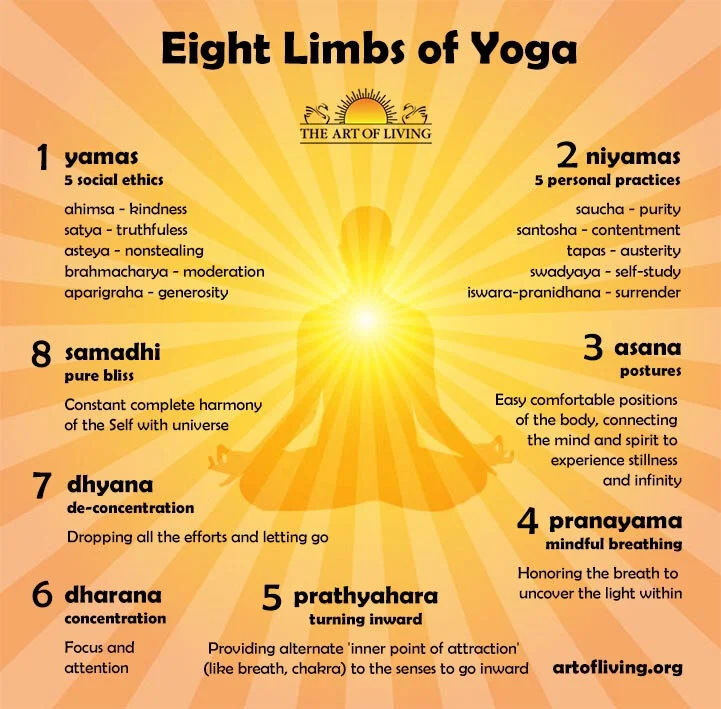Ahimsa-Do No Harm.
Ahimsa is a Sanskrit word that means non-harming or nonviolence, and its reverence exists in Hindu, Jain and Buddhist religions.
The Yoga Sutras of Patanjali’s philosophical texts constitute the foundations of Yoga and offer us guidance within our practice, both on and off the mat. Ahimsma is part of this eight limb Yoga system (see pic below) and is the first limb of the five Yamas (self-restraint) and with the second limb-Satya (truth) make up the code of ethical conduct in Yoga philosophy.
In Deborah Adele’s book “The Yamas & Niyamas -Exploring Yoga’s Ethical Practice”, she states:
“The Yamas & Niyamas are foundational to all yogic thought. Yoga is a sophisticated system that extends far beyond doing yoga postures; it is literally a way of living. Yoga is designed to bring you more and more awareness of not only your body but also your thoughts. “
Yoga is a lifestyle, and in regards to personal and community ethics, Ahimsa guides me in my daily living and decisions. It’s evident that deliberately harming someone physically or emotionally is unacceptable, but it’s the more subtle parts of Ahimsa that require everyday commitment; how we treat our bodies, our thoughts, others and our community.
Ahimsa in Asana (Yoga postures)
Listening to your body and honouring where it’s at is paramount to Yoga practice. Modifications and resting are encouraged to avoid injury—beyond the mat, taking care of your body through movement and paying attention when it’s not feeling right is the ultimate in self-care.
Ahimsa in Thought
Your thoughts are potent and have energy. Are you judgemental of yourself or others? Do the majority of your thoughts consist of replaying old, negative stories or feeling that you are not good enough or calling yourself an “idiot.” Do you complain, gossip and judge others too quickly? We all have these moments when we view ourselves, others, and the world through a negative lens. I believe it’s essential to be still and quiet with our emotions, as it can help us figure out what is going on and work through them and eventually release them. However, if this negative way of thinking is your default, it’s something to work on. What you focus on expands, and the more you complain and are negative, the more things you’ll find to complain and be pessimistic about.
I love this quote from Bernard Meltzer and it applies to what we say and think about ourselves and others:
“Before you speak, ask yourself if what you are going to say is true, is kind, is necessary, is helpful. If the answer is no, maybe what you are about to say should be left unsaid.”
It’s not necessary to observe all of your thoughts-this might genuinely cause you to go mad, but developing self-awareness of the thoughts that are taking up headspace and working toward more kind, ‘non-violent’, loving thoughts will cause dopamine (the ‘feel good, ‘relaxation’ chemical) to be released into your body. This strengthens the immune system and has the power to cure us of illness.
“Watch your thoughts; they become words. Watch your words; they become actions. Watch your actions; they become a habit. Watch your habits; they become character. Watch your character; it becomes your destiny.” – Lao Tzu
Ahimsa in Diet
Food is medicine and eating wholesome, unprocessed, organic food is an excellent way to prevent disease and ensure overall well being.
#3-#7 of the Eight Limbs Of Yoga are practiced in a yoga class and parts of # 1 and #2. (picture credit- The Art of Living )
Ahimsa sounds easy in theory, but it is harder to practice and maintain and requires consistent commitment. Having only pure thoughts and intentions is an impossible expectation, but ensuring the balance is on the positive side of the scale is what you want to aim for. When I’m having a rough few days of feeling down and negative, I know it’s time to be still and tune into what is going on with me, and most of the time, I discover that I haven’t eaten or slept well, and need to work on letting some things go and creating some space. I often ask myself “are my thoughts and actions in alignment with Ahimsa?”
Ahimsa provides us with a guide on how we act in the world, with ourselves, the environment and all sentient beings. It’s a practice of self-regulation designed to free us from being victims of our negative impulses. It’s a practice that clears the mind, body and spirit and allows us to live a more conscious and joyful life. This is Yoga.
Be well.
Anita



